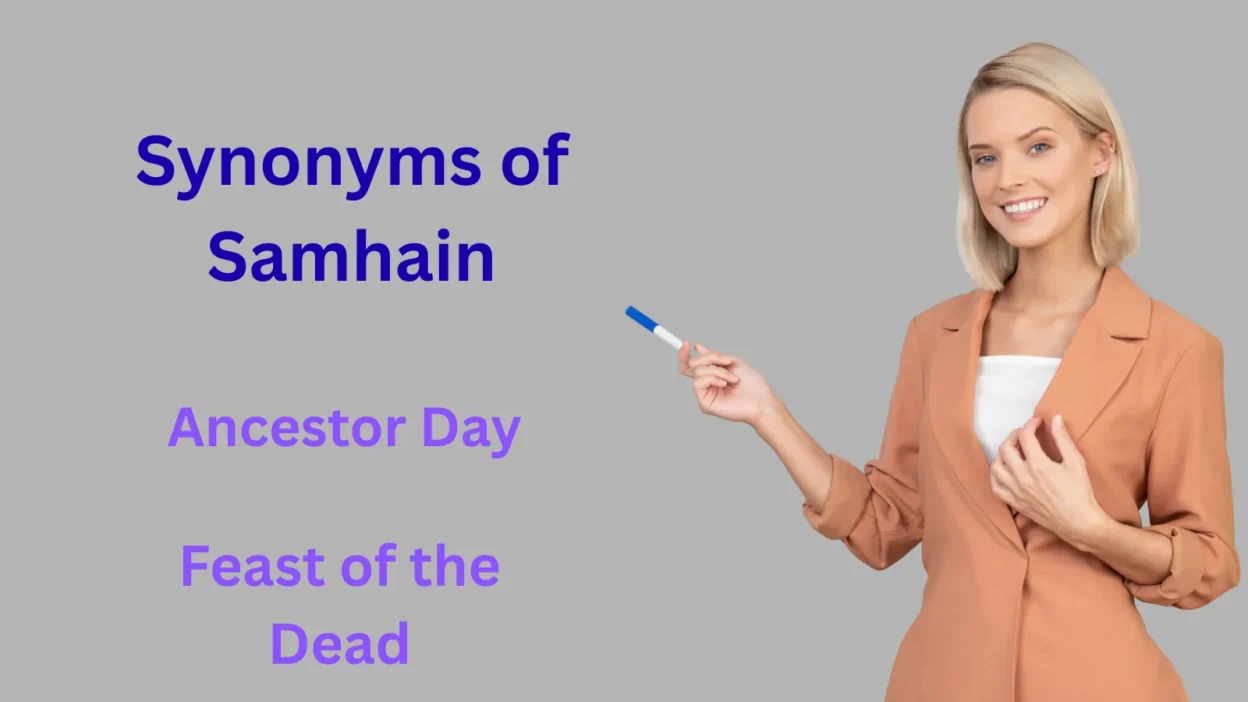Synonyms for Samhain help describe the ancient Celtic festival that marks the end of the harvest season and the beginning of winter. Common alternatives include Halloween, All Hallows’ Eve, and the Day of the Dead in related cultural contexts. For example, many communities celebrate Samhain with bonfires, costumes, and rituals honoring ancestors.
Using the right synonym lets you highlight the cultural, historical, or seasonal aspects of this mystical celebration. Each word brings a slightly different shade of meaning when describing this festival.
If you’re writing about folklore, cultural traditions, or seasonal celebrations, choosing precise synonyms for Samhain helps your descriptions feel authentic, evocative, and engaging.
In this article, you’ll get the meaning and example sentence for each synonym of Samhain, so that you can discuss this ancient festival with clarity and flair.
What Does Samhain Mean?
At its core, Samhain refers to a Celtic festival marking the transition from harvest to winter. It’s often:
- A time for honoring ancestors
- Associated with supernatural or mystical elements
- Celebrated with fire, costumes, or rituals
- A reflection of seasonal change
It’s not just a festival—it’s a bridge between the living and the spiritual, past and present. Think of Samhain as a celebration that mixes reverence, mystery, and communal tradition.
Synonyms & Related Words for Samhain (And When to Use Them)
1. Halloween
Meaning: The modern holiday derived from Samhain, emphasizing costumes, trick-or-treating, and playful spookiness.
Example: “Children eagerly prepared their pumpkin for Halloween, unaware of its roots in ancient Samhain traditions.”
When to use: Best for contemporary, playful, or commercial contexts.
2. All Hallows’ Eve
Meaning: The evening before All Saints’ Day, directly linked to Samhain.
Example: “On All Hallows’ Eve, families lit candles to honor departed ancestors.”
When to use: Formal or historical writing; evokes a reverent, solemn tone.
3. Spirit Night
Meaning: Emphasizes the presence of spirits or supernatural activity.
Example: “Children whispered tales of ghosts on Spirit Night, hoping to catch a glimpse.”
When to use: Creative writing or paranormal themes.
4. Feast of the Dead
Meaning: Emphasizes the ancestral and spiritual focus of Samhain.
Example: “Villagers gathered for the Feast of the Dead, leaving offerings at gravesites.”
When to use: Ritualistic, historical, or cultural contexts.
5. Celtic New Year
Meaning: Refers to Samhain as the start of the Celtic calendar year.
Example: “Samhain was celebrated as the Celtic New Year, marking both endings and beginnings.”
When to use: Historical or educational content.
6. Witching Night
Meaning: Highlights the mystical, magical, and folkloric elements of Samhain.
Example: “It was said that on witching night, spirits and witches roamed freely.”
When to use: Fantasy writing, storytelling, or when emphasizing magic.
7. Harvest End Festival
Meaning: Focuses on Samhain as the close of the agricultural year.
Example: “The Harvest End Festival brought the community together to store their crops.”
When to use: Historical or seasonal agricultural context.
8. Spooky Night
Meaning: A colloquial, playful term highlighting supernatural or eerie aspects.
Example: “The forest was silent and dark, perfect for a spooky night adventure.”
When to use: Informal writing, storytelling, or humor.
9. Dark Harvest
Meaning: Combines agricultural and supernatural associations of Samhain.
Example: “The villagers celebrated the Dark Harvest with bonfires and storytelling.”
When to use: Gothic or evocative narratives.
10. Ancestor Day
Meaning: Focuses on honoring the dead, a key aspect of Samhain.
Example: “Ancestor Day was observed with quiet reflection at family graves.”
When to use: Cultural or reflective contexts.
11. Night of Shadows
Meaning: A poetic synonym highlighting mystery and the liminal space between life and death.
Example: “The Night of Shadows brought a chilling hush over the countryside.”
When to use: Literary or atmospheric writing.
12. Autumn Festival
Meaning: A general term emphasizing seasonal transition.
Example: “The Autumn Festival marked the shift from warmth to the cold months ahead.”
When to use: Broader seasonal contexts without mystical connotations.
13. Hallows’ Eve
Meaning: A shorthand for All Hallows’ Eve, directly tied to Samhain.
Example: “Villagers prepared costumes for Hallows’ Eve celebrations.”
When to use: Slightly informal or poetic historical writing.
14. Samoni
Meaning: The Lithuanian variant of Samhain, emphasizing regional traditions.
Example: “In Lithuania, Samoni is marked with rituals honoring ancestors.”
When to use: Cultural or ethnographic writing.
15. Winter’s Eve
Meaning: Emphasizes seasonal transition, hinting at cold and darkness.
Example: “Winter’s Eve brought long shadows and the first frost of the year.”
When to use: Poetic or atmospheric narratives.
16. All Saints’ Eve
Meaning: Religious variant focusing on the Christian adaptation of Samhain.
Example: “All Saints’ Eve services reminded the faithful of those who had passed.”
When to use: Religious or historical contexts.
17. Halloween Eve
Meaning: A modern, casual way to refer to the night before Halloween.
Example: “Halloween Eve was buzzing with excitement in the neighborhood.”
When to use: Contemporary, informal writing.
18. Liminal Night
Meaning: Highlights the transitional, in-between aspect of Samhain.
Example: “The liminal night was said to thin the veil between worlds.”
When to use: Fantasy, literary, or metaphysical contexts.
19. Bonfire Night
Meaning: Refers to the fire rituals often associated with Samhain.
Example: “The Bonfire Night celebrations lit up the village square.”
When to use: Historical or festival-focused writing.
20. Night of the Departed
Meaning: Emphasizes remembrance of the dead.
Example: “Families shared stories and offerings on the Night of the Departed.”
When to use: Reflective, spiritual, or cultural discussions.
21. Pagan New Year
Meaning: Highlights Samhain as the start of the pagan calendar.
Example: “The Pagan New Year brought ceremonies to honor past and future.”
When to use: Historical, cultural, or religious writing.
22. Festival of Souls
Meaning: Emphasizes spiritual or mystical aspects.
Example: “The Festival of Souls was a night of quiet reflection and reverence.”
When to use: Poetic or narrative writing about spirits.
23. Hallows Festival
Meaning: A creative, formal way to describe the holiday.
Example: “The Hallows Festival involved lighting candles and sharing stories.”
When to use: Literary, historical, or fantasy contexts.
From flirty texts to professional responses, Linguisticss.com delivers ready-to-use lines that make conversations easy and fun.
24. October’s End
Meaning: Focuses on the calendar transition, poetic in tone.
Example: “October’s End brought a chill that hinted at the coming frost.”
When to use: Atmospheric or seasonal writing.
25. Shadow Festival
Meaning: Emphasizes darkness, mystery, and supernatural themes.
Example: “During the Shadow Festival, tales of spirits filled the night.”
When to use: Gothic, mystical, or fantasy contexts.
26. Day of Remembrance
Meaning: Focuses on honoring ancestors or those who have passed.
Example: “Day of Remembrance was observed with offerings and quiet reflection.”
When to use: Spiritual, solemn, or cultural contexts.
27. Night of the Ancestors
Meaning: Similar to Day of Remembrance but emphasizing the nighttime rituals.
Example: “Stories and songs echoed through the village on the Night of the Ancestors.”
When to use: Cultural, historical, or storytelling contexts.
28. Samhain Eve
Meaning: Directly refers to the night before Samhain itself.
Example: “On Samhain Eve, bonfires burned to guide wandering spirits.”
When to use: Accurate historical or cultural writing.
29. Mystical Night
Meaning: Highlights magical or supernatural associations.
Example: “A mystical night of whispers and shadows unfolded in the forest.”
When to use: Fantasy, literary, or poetic writing.
30. Harvest Twilight
Meaning: Emphasizes the end of harvest and transition to darker months.
Example: “During Harvest Twilight, villagers reflected on the year’s abundance and loss.”
When to use: Poetic, seasonal, or reflective narratives.
How to Choose the Right Synonym
Selecting the right synonym for Samhain depends on tone, context, and audience:
- Playful or modern: Halloween, Spooky Night, Halloween Eve
- Historical or formal: All Hallows’ Eve, Celtic New Year, Samhain Eve
- Spiritual or reflective: Feast of the Dead, Day of Remembrance, Night of the Ancestors
- Mystical or poetic: Witching Night, Liminal Night, Mystical Night
- Seasonal or agricultural: Harvest End Festival, Autumn Festival, Dark Harvest, Harvest Twilight
Understanding subtle nuances is key. For example, “Halloween” may evoke candy and costumes, while “Feast of the Dead” emphasizes solemn ancestor veneration. “Liminal Night” conveys mystery and transition, perfect for fantasy narratives.
When choosing, ask yourself:
- Are you emphasizing fun, tradition, spirituality, or mystery?
- Is the context historical, contemporary, literary, or cultural?
- What emotional tone should the reader feel—celebratory, reverent, eerie, or reflective?
Conclusion
Samhain, as an ancient Celtic festival marking the end of the harvest and honoring the spirits of the departed, carries rich cultural and spiritual significance. Its synonyms—such as Celtic New Year, Festival of the Dead, and Harvest’s End—reflect its roots in nature, ancestry, and seasonal cycles.
Understanding these alternatives helps us appreciate the depth of Samhain beyond the modern Halloween celebration and highlights the ways this timeless tradition continues to influence contemporary spiritual and cultural practices.
Today, Samhain is still celebrated by many who honor its rituals, keeping the connection to ancestors and nature alive. Exploring its synonyms not only enriches our vocabulary but also deepens our appreciation for this ancient festival.





